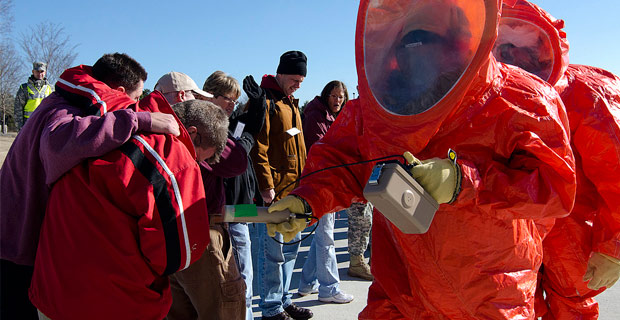[Author]by Mike Adams[/Author]
The possibility of Ebola being harvested by would-be terrorists and used as a bioweapon in a large city is now at the front of the minds of many. Dr. Peter D. Walsh of the University of Cambridge is publicly raising the alarm over the same warning I issued last week here on Natural News when I wrote, “Ebola is a perfect bioweapon. Because of its ability to survive storage and still function many days, weeks or years later, it could be very easily harvested from infected victims and then preserved using nothing more than a common food dehydrator.”
Now, Dr. Walsh is adding his voice to the warning in an article published in The Sun, saying “serious risk is that a group manages to harness the virus as a powder, then explodes it in a bomb in a highly populated public area. It could cause a large number of horrific deaths.”
What both of us quickly realized as this situation unfolded is that Ebola virus is not very difficult to acquire because infections are so widespread. Harvesting the virus is a simple matter of taking a few droplets of blood from a patient who already has the disease (and trying not to infect yourself in the process).
Ebola is easy to make into a bomb, doctor warns
As I pointed out last week here on Natural News, Ebola remains viable indefinitely if stored properly. The Public Health Agency of Canada explains:
The virus can survive in liquid or dried material for a number of days. Infectivity is found to be stable at room temperature or at 4 (C) for several days, and indefinitely stable at -70 C.
As CBS Local reports:
…biological anthropologist Dr. Peter Walsh says that the risk should be taken seriously of terror groups getting their hands on the Ebola virus. “A bigger and more serious risk is that a group manages to harness the virus as a powder, then explodes it in a bomb in a highly populated area,” Walsh told The Sun. “It could cause a large number of horrific deaths.”
Once the material has arrived on location, as Dr. Walsh describes, it can be strapped to a chemical bomb of some sort to disperse the Ebola material in a crowded area such as a train station, subway station, etc. Enclosed, indoor areas are the most likely targets by terrorists because they maximize the concentration of the material during dispersal.
“EXPERTS fear terror groups are building a “dirty bomb” containing the fearful flesh-eating Ebola virus and plan to explode it in a UK city,” reports News.com.au.
A self-replicating weapon
The reason Ebola is such a dangerous bioweapon is because it self-replicates. The terrorists who invoke such a weapon are not merely causing fatalities among those who are immediately infected; they also initiate a ripple effect that may result in hundreds, thousands or even tens of thousands of others being infected before full containment is achieved.
Infectious disease bombs would also be extremely demanding on emergency responder resources, tying up not just police and investors but also hospitals, doctors and infectious disease experts. The logistics of quarantine and patient transportation are also a nightmare for any local or national government to deal with.
At the same time, the fear factor of a bioweapon attack has enormous “payoffs” for terrorists who are attempting to create as much terror as possible. The idea that an invisible, deadly weapon has been unleashed in their own city will drive many residents to the brink of total panic. The fear will paralyze the city and shut down nearly all commerce, transportation and employment.
Thus, an “Ebola dirty bomb” achieves a kind of economic and psychological destruction which simply can’t be matched by a chemical bomb. Ebola is terrifying all by itself, and pairing it with a deployment device multiplies the terror effect on the population.
Can we stop such acts of terrorism?
The real question on this is glaringly obvious: Can we stop the deployment of such a bomb in a large city like New York or London?
Despite the best efforts of law enforcement and national security operators, the realistic answer is a resounding “no.” Ebola is relatively easy to harvest by a determined terror group, and making a bomb to disperse it is a simple matter.
So the usual law enforcement approach of trying to keep tabs on people buying explosive materials won’t be helpful in this case. It’s almost impossible to prevent someone from building and deploying such a device.
Low-tech weapons that rival the destruction of nukes
Keep in mind that there really are evil groups trying to destroy America at every turn. Some of them operate from far outside the USA, but others are operating right now inside the country. With a bioweapon like Ebola, they have easy access to low-tech weapons of mass destruction, and biological weapons can approach the devastation of nuclear weapons because of their self-replication capabilities.
What makes this situation even more complex is that the source of the attacks can be concealed, so the American military has no idea who to attack in response. If a terror group unleashes an Ebola dirty bomb at Grand Central Station, who does the Pentagon nuke in return? There’s no answer because nobody knows… at least not right away.
An Ebola dirty bomb can be constructed and deployed by a surprisingly small team. This team could be funded by a rogue government using a variety of covert funding technique leaving no traces of their origin. Regimes like North Korea have already announced their intentions to attempt to destroy America by striking us with nuclear weapons. It is not out of the realm of possibilities that North Korea could fund a rogue bioweapons team to attempt to cause an Ebola pandemic in America.
Accidental pandemic
There’s also the possibility that U.S. health authorities might accidentally unleash Ebola on the U.S. population by making a serious error in their handling of Ebola patients.



